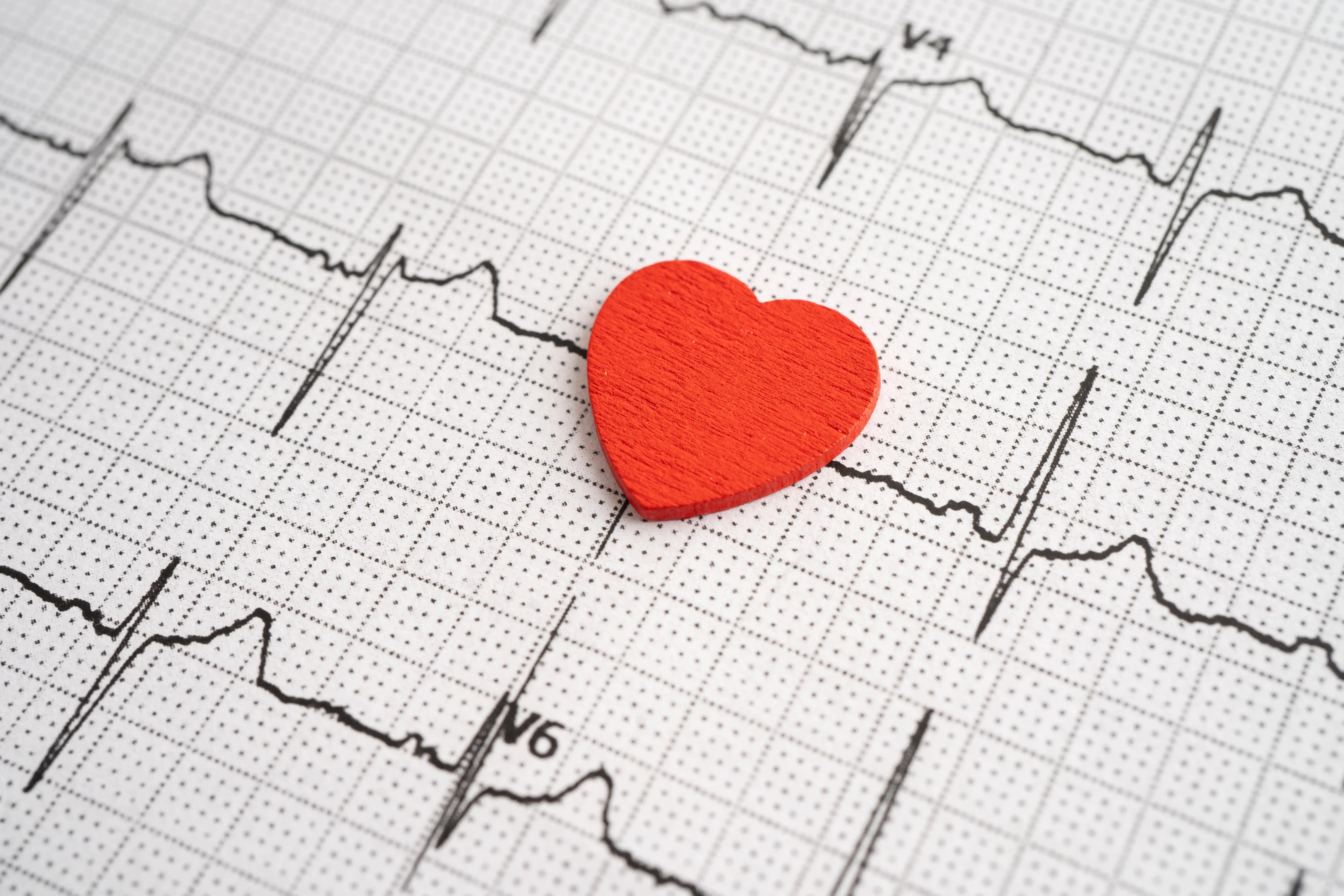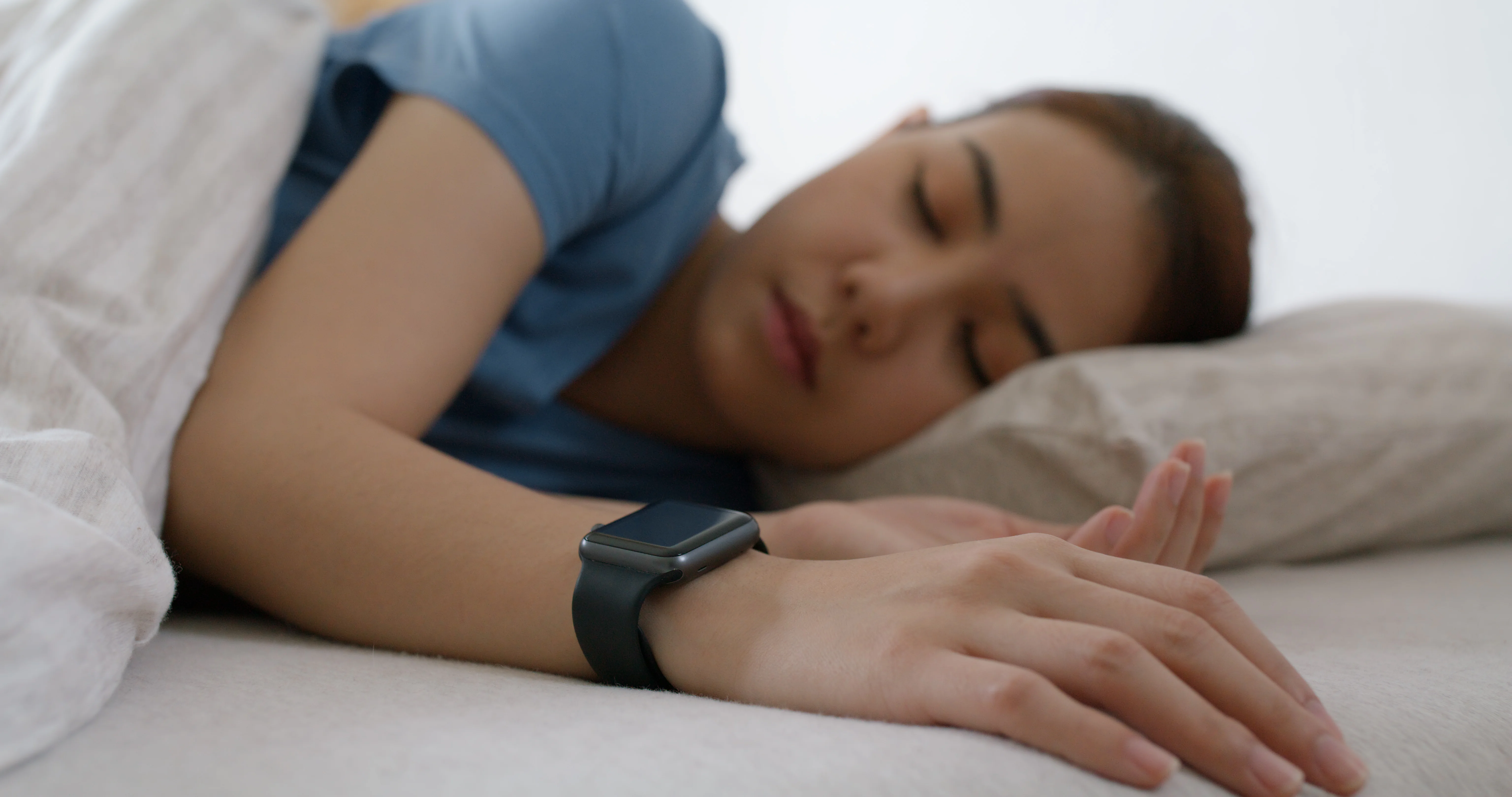Your heart rate is a key indicator of your overall bodily health, revealing the rate at which your body is functioning. While we commonly associate heart rate with exercise, it is also vital that you discover how your heart rate behaves during sleep.
Sleep is a critical time for recovery, and as your body progresses through different stages of sleep, your heart rate naturally slows. But factors like age, fitness level, and stress can influence your sleeping heart rate.
By monitoring your sleeping heart rate, you can gain useful information about your physical health, potentially identifying potential problems early on before they become serious.
In this article, we will explore what a normal heart rate is during sleep, how things affect the rate, and how to monitor and maintain your heart rate for better physical well-being and sleep quality.
What Is a Normal Heart Rate?

Your heart rate, or how many times your heart beats during one minute, can provide a lot of information about your overall health. It varies normally throughout the day depending on physical activity, emotions, and even the time of day.
Knowing what is normal for your sleeping heart rate is important in keeping your cardiovascular system healthy.
Understanding Resting and Sleeping Heart Rate
Your resting and sleeping heart rates are two significant measurements that provide information about your physical well-being, especially your cardiovascular fitness. Both are essential for tracking the health and efficiency of your heart since they can indicate how efficiently your body is working at rest and while sleeping.
The resting heart rate is the number of beats per minute when your body is at rest, typically when you wake up in the morning and are still in bed. It's a measure of how well your heart is pumping blood to the rest of your body without any extra physical stress.
For most adults, the normal resting heart rate is 60 to 100 beats per minute (bpm). However, well-trained athletes will have a slower resting heart rate, even less than 60 bpm, as they have more efficient cardiovascular systems.
Sleeping heart rate, on the other hand, is the number of times your heart beats per minute while you’re asleep. During sleep, especially in deeper stages, your heart rate naturally slows down as your body enters a state of rest and recovery. This drop in heart rate allows your heart to recuperate and conserve energy. It is typical for a sleeping heart rate to be 40 to 60 bpm in adults, though the range may vary depending on factors of age, fitness, and overall health.
Sleeping Heart Rates by Ages
Heart rate varies naturally with age, and knowing these changes can enable you to understand what is normal for your age group.
The younger you are, the faster your heart will beat while sleeping because your body is growing and requires additional energy. As you age, your heart rate will generally slow down as a result of changes in your cardiovascular health and fitness level.
Below is a table showing the typical sleeping heart rate ranges by age group:
| Age | Sleeping Heart Rate (bpm) |
|---|---|
| Infants (0 to 12 months) | 107-145 bpm |
| Toddlers (1 to 2 years) | 103-135 bpm |
| Children (3 to 6 years) | 86-117 bpm |
| Children (6 to 12 years) | 74-103 bpm |
| Teens (13 to 19 years) | 62-93 bpm |
| Young Adults (20 to 40 years) | 66-94 bpm |
| Adults (41 to 60 years) | 61-87 bpm |
| Older Adults (61 to 70 years) | 60-86 bpm |
| Seniors (71 or older) | 63-85 bpm |
These ranges are approximate but can vary based on general health, fitness level, and other factors. For example, more athletic or fit people can have lower sleeping heart rates even at younger ages.
Older people can have a slightly higher heart rate due to alterations in cardiovascular function. Tracking your sleeping heart rate over time is the best way to measure what is normal for you.
Factors Affecting Sleeping Heart Rate

Your sleeping heart rate can be influenced by a variety of factors, ranging from your physical fitness to your emotional state, and even the environment in which you sleep.
Understanding these factors can help you recognize what may cause fluctuations in your heart rate during sleep and how to keep it within a healthy range.
How Heart Rate Changes Throughout the Sleep Cycle
As you sleep, your body moves through different sleep stages, each affecting your heart rate in its way. During non-REM sleep, your heart rate slows down as your body focuses on deep rest and recovery. In REM sleep, when dreaming happens, your brain becomes more active, and your heart rate can fluctuate. Each stage plays a role in how your body and heart function while you sleep.
During non-REM sleep, particularly in the deeper stages, your heart rate slows significantly. This stage is important for the body's restorative processes, such as tissue repair and immune system development.
As your body is in deep sleep, the need for energy is less, allowing the heart to beat more slowly and efficiently. This slowing of the heart rate is a natural response to the body's lower need for oxygen and nutrients during resting.
Conversely, in REM sleep, when dreaming, your heart rate can increase. This increased heart rate in REM sleep is a result of increased brain activity since the brain is more active and more information is being processed.
Consequently, there's increased blood flow to the brain and organs. Your heart may beat faster during this stage, sometimes approaching levels similar to those experienced when awake. This increase in heart rate during REM sleep is normal and is associated with the body being active when dreaming, even though it is resting.
Fitness Level and Physical Activity
Maintaining an active lifestyle and regularly doing physical activity can greatly reduce your sleeping heart rate. The heart becomes stronger with exercise, so it is able to circulate blood more efficiently, thereby reducing the need for a high heart rate while in the resting state.
People who exercise or incorporate movement into their everyday lives, such as walking, cycling, or other forms of light exercise, will have a slower sleeping heart rate.
Athletes, in particular, will have a resting and sleeping heart rate well below the normal level for their age group because their cardiovascular systems are more efficient. Even ordinary physical activity can also have a positive impact on heart health, making your heart rate during sleeping time even slower naturally.
Mental Health
Mental health significantly affects heart rate, even during sleep. Conditions like stress and anxiety can disrupt sleep by increasing heart rate.
- Stress and Anxiety: Mental health disorders such as depression, anxiety, and stress affect your heart rate, even while sleeping. Under stress, the body discharges hormones such as cortisol, which raises the heart rate and gets the body ready for a "fight or flight" state. This might lead to an increased heart rate, disturbing your chance to go into a deep, restful sleep, resulting in compromised sleep quality. Stress can lead to long-term cardiovascular problems as well.
- Relaxation: Relaxation techniques such as meditation, mindfulness, and slow breathing can also lower heart rate and lead to relaxation. These techniques activate the parasympathetic nervous system, which relaxes the body and lowers the heart rate. This improves the quality of sleep by helping you reach deeper stages of sleep and wake up refreshed. Relaxation practice every day can also reduce the impact of stress on the cardiovascular system over time.
Diet and Hydration Before Bed
Your diet and hydration levels before sleep can directly impact your heart rate and sleep quality. What you consume can either help stabilize or elevate your heart rate, potentially leading to poor sleep.
- Caffeine and Sugar: Consuming caffeine or sugary foods before going to bed can affect your heart rate and disrupt your sleep. Caffeine is a stimulant, and it raises heart rate and makes it harder to fall asleep. The same happens with sugary foods, as they cause blood sugar levels to surge, and that could also increase heart rate, making it difficult to have a good night's sleep. It is advisable to avoid caffeine and sugary snacks for at least 3–4 hours before bedtime to ensure a calm heart rate.
- Alcohol: While alcohol might calm and drown you initially, it has the opposite effect during sleep. Alcohol can speed up your heart rate, especially during the later stages of sleep, such as REM sleep. It also disrupts sleep cycles, reducing restorative deep sleep. Thus, consuming alcohol before bed might not only affect your heart rate but also lead to poor, fragmented sleep.
- Hydration: Proper hydration maintains overall body functions, such as controlling heart rate. Dehydration causes your heart to work harder to circulate blood, potentially causing a higher heart rate at night. It is important to be hydrated during the day, but avoid excessive consumption near bedtime, which can also cause nighttime awakenings to use the bathroom and disrupt your sleep.
Sleep Disorders
Sleep disorders can significantly affect your heart rate by disrupting your normal sleep cycle. These disruptions often lead to fluctuations in heart rate, which can have long-term impacts on cardiovascular health.
- Sleep Apnea: Sleep apnea is a common sleep disorder in which your breathing will stop and start repeatedly during sleep. These interrupted breaths cause extreme fluctuations in your heart rate, leading to rapid spikes and drops. These changes can stress your cardiovascular system over time, causing high blood pressure, heart disease, and stroke. Sleep apnea tends to encourage low-quality sleep since your body struggles to reach the deep, restorative levels of rest, further affecting your heart rate.
- Insomnia: Insomnia, or persistent difficulty falling or staying asleep, can result in irregular sleep patterns that disrupt your normal sleep cycle. This disruption can result in your heart rate elevating, as your body is put under more stress and the nervous system becomes more active. The lack of sufficient rest can exacerbate heart rate irregularities, resulting in overall poor cardiovascular health. Insomnia is also followed by anxiety and stress, which can elevate the sleeping heart rate.
- Restless Legs Syndrome (RLS): RLS is a condition characterized by the urge to move the legs, typically accompanied by leg discomfort. The leg movements typically occur when one is asleep, therefore resulting in frequent waking up and disrupted sleep. Consequently, there is an acceleration in heart rate in response to such interruptions. Repeated restlessness and disrupted sleep may lead to increased heart rate, thus contributing to the inability to get a restful night's rest.
Temperature and Sleeping Environment
The room temperature significantly influences your heart rate while sleeping. If too hot or cold, your body will exert more energy maintaining its temperature, raising your heart rate. Exposure to excessive temperatures initiates stress, and the heart beats faster. For proper sleep and heart rate control, a cool room with a temperature of 60-67°F (15-19°C) is preferred for deep sleep without unnecessary stress.
Additionally, your mattress, pillow, and bedding also play an important role in sleep quality as well as the regulation of heart rate. Beds that are uncomfortable can cause restlessness and nighttime wakings. This disrupts your sleeping process and may cause increased heart rate due to stress or discomfort.
Proper support from a good pillow and mattress helps maintain a neutral body posture, reducing the likelihood of turning and tossing, and ultimately supporting a lower, stable heart rate during the night.
Medications and Medical Conditions
Some medications, such as beta-blockers, can reduce your heart rate at night, while other medications can increase it. If you notice significant changes in your heart rate or experience symptoms like dizziness, fatigue, or palpitations while on medication, you need to see your doctor for guidance.
Chronic conditions, such as hypothyroidism, heart disease, or hypertension, can also affect your sleeping heart rate. For example, hypothyroidism can lower the heart rate, leading to bradycardia, while heart disease or high blood pressure increases it and leads to tachycardia. These diseases can affect the natural heart rhythm of your body and your sleep quality.
It is necessary to regulate such conditions with the help of a doctor to maintain healthy sleep and heart rate patterns, keeping them within a safe and stable range. Regular checkups and proper treatments will eliminate complications from heart rate abnormalities.
Low Heart Rate: When It’s a Concern

A low heart rate, or bradycardia, occurs when the heart beats fewer than 60 times per minute. While it can be normal for well-trained athletes or during deep sleep, bradycardia can also be a sign of underlying health issues. If your heart rate consistently falls below 60 bpm, it is important to monitor it and seek medical advice, especially if accompanied by symptoms like dizziness or fatigue.
What Causes Bradycardia During Sleep?
Various conditions and factors can lead to bradycardia during sleep. It is essential to understand these causes to address them properly and maintain a healthy heart rate.
- Heart Conditions: Various heart conditions, such as heart block, sick sinus syndrome, and atrial fibrillation, can lead to bradycardia. In these cases, the heart’s electrical signals are disrupted, causing it to beat more slowly. When this occurs during sleep, it can lead to insufficient blood flow to important organs and result in fatigue or dizziness when waking.
- Hypothyroidism: The thyroid gland regulates metabolism, and an underactive thyroid (hypothyroidism) can slow down many body functions, including heart rate. Low thyroid hormone levels can lead to a slower heart rate, causing bradycardia. If left untreated, hypothyroidism can significantly impact heart health and sleep quality.
- Anorexia: Severe caloric restriction, as seen in anorexia nervosa, can lead to bradycardia. The body enters a state of energy conservation during starvation, slowing down processes, including the heart rate. Chronic anorexia can threaten one's life due to the strain it puts on the cardiovascular system.
- Rheumatic Fever: This inflammatory disease, which can result from a strep throat infection, can affect the heart valves and electrical system. It may cause bradycardia by disrupting the heart’s ability to maintain a normal rhythm, leading to slower heartbeats during sleep.
- Lyme Disease: Caused by bacterial infection, Lyme disease can affect the heart by leading to Lyme carditis. This can cause damage to the heart’s electrical system, resulting in a slow heart rate or even a heart block, which can worsen during sleep.
- Medications: Certain medications, such as beta-blockers, calcium channel blockers, and digoxin, can slow down the heart rate. These medications are often prescribed for conditions like high blood pressure, arrhythmias, or heart failure but can cause bradycardia as a side effect. If you experience symptoms of low heart rate, consult your doctor to see if your medication is contributing to the issue.
Risks Associated with Low Heart Rate
Bradycardia can lead to various health complications if left untreated. Understanding the risks associated with a slow heart rate is important for preventing long-term damage.
- Reduced Blood Flow: A slow heart rate may lead to inadequate blood circulation, which means that vital organs like the brain and kidneys may not receive enough oxygenated blood. This can result in symptoms such as dizziness, confusion, or fatigue, which can worsen over time if untreated.
- Fainting or Dizziness: When the heart rate is too slow, it can cause low blood pressure, leading to fainting or dizziness. This is particularly dangerous if it occurs while you are sleeping or upon waking, as it increases the risk of falls and injuries.
- Heart Failure: Chronic bradycardia can put additional strain on the heart, especially if the heart is already weakened by other conditions. Over time, this can contribute to heart failure, where the heart is unable to pump enough blood to meet the body’s needs, leading to fluid buildup and reduced oxygen delivery to tissues.
- Arrhythmias: Bradycardia can lead to arrhythmias (irregular heartbeats), which may threaten one’s life if left untreated. When the heart beats too slowly or irregularly, it can cause the heart to beat erratically or even stop completely, which requires immediate medical intervention.
- Poor Exercise Tolerance: With a slower heart rate, the body may not be able to respond effectively to physical exertion. This means that you may experience fatigue or shortness of breath during even light physical activity, as the heart struggles to keep up with the body's demands. Over time, this reduced exercise tolerance can affect overall fitness levels and contribute to further health problems.
High Heart Rate: When It’s a Concern
A high heart rate, or tachycardia, occurs when the heart beats faster than normal, typically above 100 beats per minute (bpm) in adults. While it can sometimes be a natural response to physical activity or stress, a consistently high heart rate during sleep could indicate an underlying health problem.
If your heart rate remains elevated while you sleep or you experience symptoms like dizziness or chest pain, it is important to seek medical advice.
What Causes Tachycardia While Sleeping?
Several factors and conditions can lead to tachycardia during sleep. These can affect the heart’s rhythm, and it’s important to understand the causes to take the right steps for treatment.
- Stress and Anxiety: Stress and anxiety trigger the release of hormones like adrenaline, which increase heart rate. Even while sleeping, if you are experiencing anxiety or stress, your body may remain heightened, causing your heart rate to stay elevated. This can lead to poor sleep quality and prevent your body from reaching restorative sleep stages.
- Heart Disease: Various heart conditions, such as atrial fibrillation, ventricular tachycardia, and congestive heart failure, can cause tachycardia during sleep. These conditions affect the heart's electrical system and can result in irregular heart rhythms. When the heart is unable to maintain a normal rhythm, it beats faster, which may occur during sleep as well.
- Stimulants: Stimulants, such as caffeine, nicotine, or certain medications, can increase heart rate. Although their effects are typically more noticeable while awake, they can still cause an elevated heart rate while sleeping, especially if consumed too close to bedtime. These substances stimulate the nervous system, leading to an increase in heart rate and a disrupted sleep cycle.
- Hyperthyroidism: An overactive thyroid gland, or hyperthyroidism, causes the body to produce excessive thyroid hormones, which can speed up the heart rate. During sleep, this can cause the heart to beat faster than normal, leading to tachycardia. In addition to an increased heart rate, hyperthyroidism may cause symptoms such as weight loss, heat intolerance, and fatigue.
Health Risks and Potential Underlying Conditions
Tachycardia can have serious health consequences, especially if left untreated. Here are some of the risks and potential complications associated with a consistently high heart rate.
- Increased Stroke Risk: Consistently elevated heart rate can increase the risk of stroke, especially in individuals with conditions like atrial fibrillation. An irregular heart rhythm can cause blood to pool and clot in the heart, which can then travel to the brain, leading to a stroke.
- Heart Attack: A persistently high heart rate can strain the heart and increase the risk of coronary artery disease, which can lead to a heart attack. Tachycardia forces the heart to work harder, increasing the likelihood of plaque buildup in the arteries, which can obstruct blood flow.
- Heart Failure: Chronic tachycardia can weaken the heart muscle over time, eventually resulting in heart failure. When the heart beats too rapidly for an extended period, it can decrease the heart’s efficiency in pumping blood, leading to fluid buildup and insufficient oxygen delivery to tissues.
- Sudden Cardiac Arrest: Extreme cases of tachycardia, especially when accompanied by arrhythmias, can lead to sudden cardiac arrest. This is a life-threatening condition where the heart stops beating suddenly. If not treated immediately, it can be fatal, making it vital to seek medical attention if you experience persistent or severe tachycardia.
- Reduced Blood Flow: Tachycardia can reduce the efficiency of the heart’s pumping action, leading to decreased blood flow to vital organs. When the heart beats too quickly, it may not have enough time to fill with blood, which can result in lower oxygen delivery to organs and tissues. This can cause symptoms like dizziness, fainting, or shortness of breath.
How to Track Your Sleeping Heart Rate

Tracking your nighttime heart rate can be extremely useful in providing you with a clearer image of your overall cardiovascular health.
Tracking heart rate changes can help you learn how well your body is resting and identify heart issues early. These are some effective tools and techniques for tracking your heart rate at night.
Tools for Monitoring Heart Rate During Sleep
Tracking your heart rate during sleep helps you better understand how well your cardiovascular system is functioning while at rest. Monitoring heart rate variations can give early signs of any potential health issues, making it easier to take preventive measures.
- Smartwatch: Many modern smartwatches, such as those from Apple, Fitbit, or Garmin, offer continuous heart rate monitoring throughout the night. These devices are equipped with sensors that track heart rate variations and provide insights into your sleeping heart rate. Some smartwatches also offer advanced features, like tracking your sleep stages and heart rate variability, which can give you a better understanding of your heart health during rest.
- Oura Ring: The Oura Ring is a popular wearable designed to track sleep patterns and monitor heart rate during sleep. This small, discreet ring offers continuous heart rate monitoring and sleep stage tracking, and provides detailed insights into your recovery, sleep quality, and overall well-being.
- Manual Method: You can also measure your heart rate manually before going to sleep and upon waking up. To do this, check your pulse at your wrist or neck for 60 seconds to see how many beats occur. This method is less precise but can give you a general idea of your resting and sleeping heart rate.
Tips to Maintain a Healthy Sleeping Heart Rate
Maintaining a healthy sleeping heart rate is essential for overall heart health and better sleep quality. Small lifestyle adjustments can go a long way in ensuring your heart rate stays within a healthy range during the night.
- Sleep Hygiene: Prioritize good sleep habits by maintaining a consistent sleep schedule, creating a calm and quiet sleep environment, and avoiding heavy meals or electronics before bed. Practicing good sleep hygiene helps your body relax and naturally regulate your heart rate, resulting in a deeper, more restorative sleep and ensuring a healthy heart rate while sleeping.
- Stress Management: Engage in relaxation techniques, such as meditation, deep breathing, or progressive muscle relaxation, to reduce stress before bedtime. Chronic stress increases heart rate, so managing it effectively can help lower your heart rate and improve sleep quality.
- Exercise Regularly: Regular physical activity strengthens the heart, allowing it to pump blood more efficiently, which leads to a lower resting and sleeping heart rate. Aim for at least 150 minutes of moderate exercise per week to improve your cardiovascular health. Learn more about the Best Exercises for Better Sleep.
- Avoid Stimulants: Avoid stimulants like caffeine, nicotine, and alcohol before bed, as these can elevate your heart rate and disrupt your sleep. Caffeine and nicotine cause increasing heart rate, while alcohol can lead to irregular heartbeats during sleep.
- Eat Heart-Healthy Foods: Incorporate a diet rich in fruits, vegetables, whole grains, lean proteins, and healthy fats to support heart health. Foods rich in omega-3 fatty acids, such as fish and walnuts, are especially beneficial for reducing inflammation and supporting normal heart rhythms. Learn more about Healthy Bedtime Snacks.
- Stay Hydrated: Proper hydration is essential for maintaining a healthy heart rate. Dehydration can make the heart work harder, leading to an increased heart rate. Drink plenty of water throughout the day, but avoid excessive fluids right before bed to prevent nighttime awakenings.
Seeking Medical Help
If you notice any abnormalities in your heart rate or experience any of the following symptoms, seeking medical advice is crucial to avoid potential health risks.
- Persistent Abnormal Heart Rate: If your heart rate consistently falls outside the normal range (either too low or too high) during sleep, consult a healthcare provider to determine the underlying cause and receive appropriate treatment.
- Experiencing Dizziness or Fainting: If you experience dizziness or fainting along with changes in your heart rate, it may indicate a more serious heart condition. Seek medical attention immediately if these symptoms occur.
- Chest Pain or Pressure: If you experience chest pain or pressure during sleep or upon waking, especially in combination with an elevated heart rate, it could be a sign of a heart condition, such as a heart attack or arrhythmia. Seek medical help right away.
- Shortness of Breath: Difficulty breathing or shortness of breath during sleep or upon waking can be a sign of heart failure or sleep apnea. Consult with a doctor if you experience these symptoms to address the underlying cause.
FAQs
What is a healthy sleep rate?
A healthy sleep rate typically falls between 40 and 60 bpm for adults. Heart rate varies by age and fitness level, with well-trained athletes often having lower rates. Tracking your sleeping heart rate can help monitor heart health and ensure it stays within a safe range.
What is an unsafe heart rate while sleeping?
An unsafe heart rate during sleep is one that consistently falls below 40 bpm (bradycardia) or above 100 bpm (tachycardia). Both conditions can lead to complications like dizziness, fainting, heart failure, or arrhythmias, requiring medical attention for proper diagnosis and treatment.
What causes sudden spikes in heart rate while sleeping?
Sudden spikes in heart rate during sleep can be caused by sleep apnea, nightmares, anxiety, or heart conditions like arrhythmias. Other factors like alcohol consumption, stress, or hyperthyroidism can also trigger rapid heartbeats, disrupting sleep and affecting heart health.
Conclusion
Tracking your sleeping heart rate is an important part of knowing your overall cardiovascular well-being. It gives you insight into how efficiently your heart is working while you are at rest and allows you to catch any developing health problems in their early stages. By knowing what a normal sleeping rate is for your age and fitness level and by considering stress, nutrition, and the quality of your sleep, you can take steps to ensure that your heart stays healthy.
Monitoring your heart rate regularly, maintaining good sleep habits, reducing stress, and exercising frequently are all effective ways to promote your heart's well-being and enhance your sleep. If any abnormalities or strange symptoms are experienced, seeking early medical advice is crucial to prevent long-term health complications.
Karen Barnard
Karen is a Human Movement Science expert and a certified sports nutrition and massage therapist. At Sleepiverse, she combines her passion for human movement science and sleep health to educate herself and her readers about healthier sleep. In addition to writing articles, Karen manages a fitness studio offering private training, athletic conditioning, and sports massage therapy. She focuses on providing people with a holistic environment for people to reach their health goals, often incorporating stretch therapy to promote mental tranquillity and help people improve their sleep.


